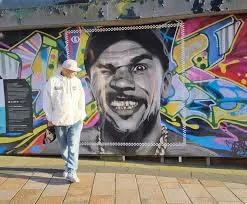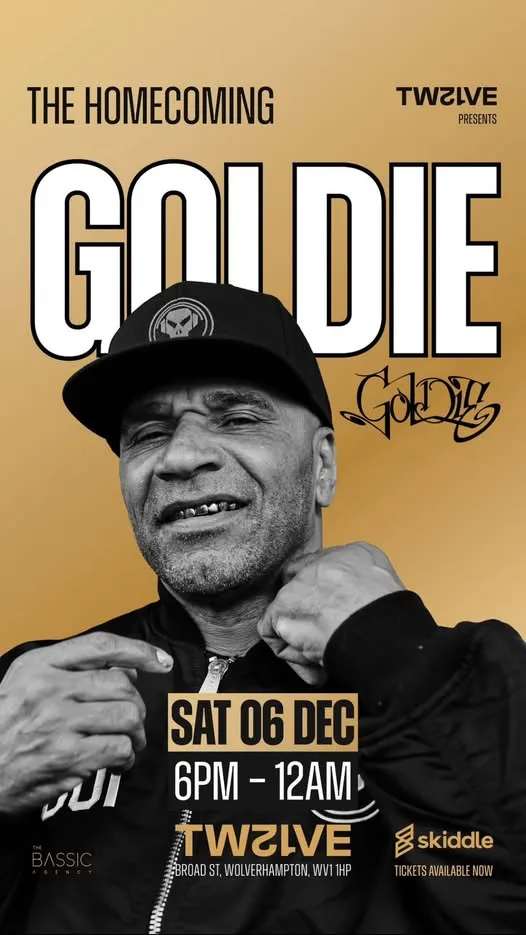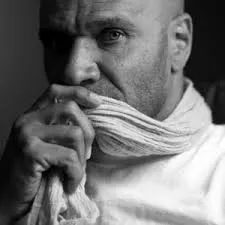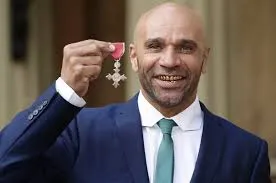Goldie: From Wolverhampton to the World
From the streets of Whitmore Reans to stages around the world, Goldie’s journey is one of transformation, creativity, and cultural impact. This article traces how Wolverhampton shaped the early life of a global music pioneer — and how, after more than two decades away, he returns home to perform once again where it all began.
Clifford Joseph Price, better known as Goldie, was born in 1965 in Walsall and grew up in Wolverhampton. Raised in foster care in Whitmore Reans and Heath Town, his early years were shaped by the city’s streets and youth clubs. Wolverhampton gave him his first creative spaces, where he discovered breakdancing and graffiti art. By the early 1980s, he was a leading figure in the Midlands graffiti scene, featured in the documentary Bombin’ and the book Spraycan Art. These moments helped bring Black British street culture to national attention and began his journey of turning lived struggle into creativity.
His story sits within a wider tapestry of Wolverhampton’s Black creative history — from reggae and sound system culture to dance and spoken word — showing how the city has long nurtured innovation and resilience in the face of adversity.
In the mid-to-late 1980s, Goldie travelled to the United States, working as a graffiti and airbrush artist while also selling custom gold teeth. Returning to the UK in 1988, he opened his Try 1 shop in Walsall, mixing art, fashion, and street entrepreneurship. His graffiti in Wolverhampton and Birmingham contributed to what became known as the “graffiti revolution” in the UK, helping to elevate the form from marginalised activity into recognised art.
The early 1990s marked a turning point as he immersed himself in the sounds of jungle and breakbeat. His 1992 track Terminator was groundbreaking, pioneering time-stretching techniques in drum and bass. By 1994, Goldie founded the iconic label Metalheadz, which became a home for experimental and underground Black British talent. Through Metalheadz, he created a collective that shaped the identity of drum and bass, bringing together artists such as Kemistry & Storm, Dillinja, and Doc Scott. The label’s club nights at London’s Blue Note became legendary, influencing electronic music culture worldwide.
In 1995, he released Timeless, a debut album that reached the UK Top 10. Its single Inner City Life became an anthem, fusing orchestral strings, soul vocals, and cutting-edge beats. The record introduced drum and bass to a global audience and established Goldie as a cultural innovator. His work showed how an artist from Wolverhampton could influence music on a worldwide scale, bridging local street culture with global recognition.
Through the late 1990s and 2000s, Goldie pushed boundaries further with his album Saturnz Return (1998), which featured collaborations with David Bowie and Noel Gallagher. At the same time, he stepped into acting roles, including James Bond: The World Is Not Enough and Guy Ritchie’s Snatch. He returned to visual art, staging exhibitions that celebrated his graffiti roots and his identity as a Black British artist. His resilience as a Black man navigating foster care, youth culture, and mainstream success offers a powerful story of survival and creativity.
In 2009, he reached a new milestone by conducting the BBC Concert Orchestra in Classic Goldie, showing his ability to bridge underground music with classical traditions at the Royal Albert Hall. This achievement reflected his vision of uniting different worlds through creativity.
Goldie’s home city recognised his influence in 2010, when the University of Wolverhampton awarded him an Honorary Doctorate in Design. This institutional recognition cemented his place in Wolverhampton’s cultural heritage. In 2016, his national impact was honoured with an MBE for services to music and young people, underlining his role as a cultural representative and role model.
In 2017, he released The Journey Man, an autobiographical double album reflecting on his life, struggles, and successes. In recent years, Goldie has continued to evolve as an artist and mentor, curating exhibitions, supporting emerging talent, and using his platform to champion mental health and creativity as pathways to resilience.
Today, Goldie continues to inspire through his art, music, and mentorship. His journey from Wolverhampton’s streets to international stages stands as a testament to creativity, resilience, and the global contributions of Black British culture.
Now, after more than 20 years, Goldie will return to Wolverhampton on Saturday 6th November to perform a two-hour set at Twelve, marking an emotional and historic homecoming. His return represents more than a musical performance — it is a reconnection with the city that shaped his identity and creativity. For Wolverhampton, it is a moment of pride, celebrating one of its own who transformed local experiences into a global artistic legacy.
As Goldie steps back onto Wolverhampton soil this November, his story comes full circle — a reminder that creativity born from struggle can echo across decades, cities, and generations.










